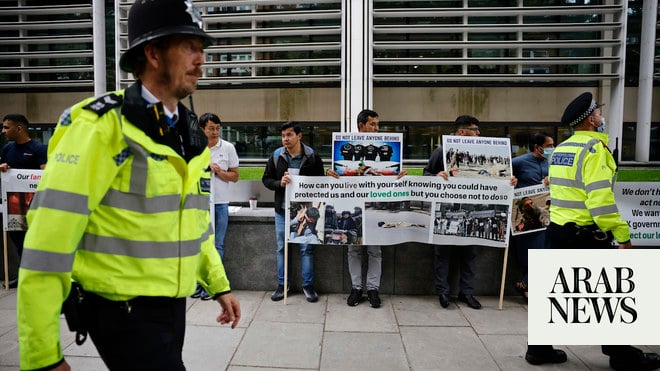
The Home Office is covering up its own research into why refugees and asylum seekers travel to the UK because ministers “know their arguments don’t stand up,” charities claim.
Officials are refusing to release its evidence on whether so-called “pull factors” play a part in asylum seekers making journeys to the UK.
On Thursday deputy prime minister Dominic Raab talked about “reducing the pull factor” in an attempt to justify the government’s controversial plans for offshore asylum processing centres in Albania. Home Office minister Chris Philp has claimed that accepting asylum seekers who have travelled through Europe “creates a pull factor where migrants are incentivised to undertake dangerous and illegal journeys”.
Yet when the Home Office was asked for evidence to support its claims, it refused. A freedom of information response dated 28 October says the material could not be disclosed because it was “likely to inhibit the free and frank provision of advice and the free and frank exchange of views for the purposes of deliberation”.
Sophie McCann, advocacy officer at Médecins Sans Frontières (MSF) UK accused ministers of knowing their arguments were ill-founded. McCann said: “Ministers are covering up evidence that is central to their case for the need to target refugees and asylum seekers with inhumane ‘deterrence’ measures.
“Ministers are refusing to release the evidence they hold on whether or not such a pull factor even exists.
McCann added: “ The reality is that ‘pull factors’ are a myth – people who are fleeing persecution or conflict don’t need any further incentive to look for safety. It is hard to see why the government would refuse to share evidence that supports its plans – the only conclusion to draw is that they know their arguments don’t stand up.”
Previous Home Office research into asylum seekers’ decision-making appears to undermine the pull factor argument for harsher policies. It says: “They [asylum seekers] are guided more by agents, the presence or absence of family and friends, language, and perceived cultural affinities than by scrutiny of asylum policies or rational evaluation of the welfare benefits on offer.”
It follows a Refugee Council report last week that highlighted misleading statements on asylum seekers by the home secretary, Priti Patel.
Analysis, partly based on Home Office data, shows that nearly two-thirds of people who cross the Channel in small boats are judged to be genuine refugees and allowed to remain – contradicting claims by Patel that 70% of small boats arrivals “are not genuine asylum seekers”.
More than 23,000 people have arrived in the UK this year in small boats, almost three times 2020’s total of about 8,500. But the overall number of arrivals is still relatively modest, certainly when compared with the number nearly 20 years ago, when UK asylum applications reached 84,132.
Yet signs are the issue is becoming a political headache for Boris Johnson and Patel. The home secretary has staked her reputation on reducing boat arrivals, but also seems unwilling to accept that refugees will continue to travel to the UK.
Experts also say boat arrivals have increased largely because the government has shut down other entry routes, such as ferries, because of increased security measures.
Meanwhile, more than 100 leaders of human rights and anti-slavery groups will write to MPs this week urging them to scrap or amend parts of Patel’s borders bill to avert “catastrophic” consequences for victims of human trafficking. The bill, currently making its way through parliament, is designed to address concerns about asylum, but its provisions will also make sweeping changes to the way modern slavery is tackled. The letter argues that conflating the two will have “unintended negative consequences” on victims of trafficking and slavery and undermine the UK’s position as a world leader in dealing with the issue.
Tamara Barnett of the Human Trafficking Foundation, which has coordinated the joint letter: “This bill will lead to fewer prosecutions of actual criminals, while those who genuinely need support, including children, will be failed by the new system. MPs need to urgently amend this bill before it’s too late.”
A Home Office spokesperson said: “The nationality and borders bill will fix the broken asylum system so it is fair but firm, helping those in genuine need, while stopping those who abuse the system.”












